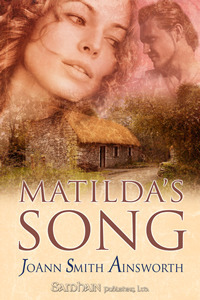Sharon Struth's Blog, page 12
April 29, 2013
Author Interview: Betsy Ashton and her novel Mad Max Unintended Consequences
Today I’m thrilled to have fellow Blue Ridge Literary Agency author, Betsy Ashton, join me. Betsy’s debut novel is Mad Max Unintended Consequences. In a review of this book on Betsy’s website, Judy Light Ayyildiz writes: “Mad Max” is a Gran with guts, humor, patience, and the wisdom that only working through life challenges brings. That alone makes me want to get to know Max a little better and she’s made her way to my summer reading list.
Betsy, thanks for joining us.
Do you recall how your interest in writing originated?
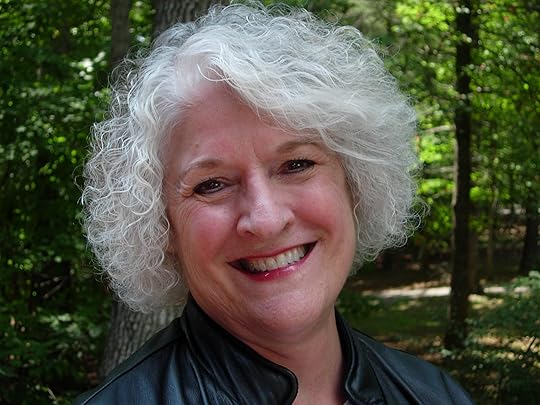
Betsy Ashton
This is an easy question with a difficult answer. I started writing in third grade when I made up my autobiography. I was seven and hadn’t done anything interesting, so I made up a character and gave her the perfect life. As I remember, I got an F on the assignment because I didn’t follow the rules and an A for creativity, although that wasn’t part of the assignment. Leave it to say, my mother was not amused by the F. She said if I was going to lie, I should learn to write stories. And to learn to write stories, I had to read as much as I could get my hands on.
Can you share a little of your current work with us?
In March Koehler Books published Mad Max Unintended Consequences, which we all hope will become a series. Mad Max is a grandmother who loves her life in Manhattan. She’s raised her two children and is now living the life of a rich widow. She lives by a special mantra: “I’m done raising children and I’m never living in the South again.” That goes out the window where her estranged daughter is seriously injured in an auto accident. Max returns to Richmond, Virginia to care for her daughter and her two grandchildren. Things don’t work out. The daughter suffers a traumatic brain injury that changes her personality completely. Max has to decide whether to invoke tough love and leave her daughter or stay and continue taking care of the family. Conflicts ensue.
Did you learn anything from writing your book and what was it?
Very good question. Yes, I had to do a lot of research into the law and into traumatic brain injury, but most of all I learned how much fun it is to see a project come together. I love the entire process of writing, from the crummy first draft through multiple drafts where I polish and refine what I’ve written. I may be goofy, but I really love the editing process, because that’s where a work comes to life. I love working with editors who see things I’ve missed. I also learned that I cannot not write, so it’s a given that books two and three in the series are well under way.
Do you have anything specific that you want to say to your readers?
Thank you. Thank you for investing time to get to know me as a writer, Mad Max, and her diverse family. Thank you for thinking about the broader themes of the novel. If one of them leads you to call a friend or relative, to reach out before it’s too late, then I’ve achieved a goal. I welcome any dialogue with readers, so if you want to reach out, please feel free to do so.
Who is your favorite character from your book and why?
I think it’s Mad Max herself. I can play off twin meanings for “mad.” She can be angry about her situation on one page and flop in the driveway and make snow angels on the next. Because she has to be strong for her grandchildren, she has to temper her natural responses to situations. She has to grow in the course of the story.
How about your least favorite character? What makes them less appealing to you?
The least favorite character is the villain, of course. I hated Hunter from the moment I wrote about him. I had to control my natural revulsion so that he didn’t come off as too evil, no negative a character. I didn’t want him to be a stereotype.
If you could change ONE thing about your novel, what would it be? Why?
I would develop Whip into a stronger character. I think he comes off a little wimpy.
Give us an interesting fun fact or a few about your book or series:
Max struggles with how to change her relationship with her daughter. Her best friend gives her a “doo-wop” (do over) to get it right this time. The doo-wop continues throughout the series.
Who is your intended audience and why should they read your book?
Book clubs come to mind. This is a women’s work, and women make up most membership in book clubs. Also baby boomers who are raising their own grandchildren due to circumstances beyond their control.
Is there a message in your novel that you want readers to grasp?
Yes. Life doesn’t give you a do over. You give yourself a do over. When you face situations that you haven’t foreseen, you have choices: make the best of them or walk away. Either answer is right, given the time and circumstances.
BUY Mad Max Unintended Consequences
For more information on Betsy, go the following links:
www.betsy-ashton.com www.madmaxisms.blogspot.com www.writenowrightnow.blogspot.com
www.facebook.com/betsy.ashton


April 4, 2013
Author Interview: JoAnn Smith Ainsworth – Romantic Suspense in the Middle Ages
I’m pleased to have fellow Blue Ridge Literary author JoAnn Smith Ainsworth join me at “Musings from the Middle Ages.” Speaking of the middle ages, JoAnn has written two medieval romantic suspense novels. If you’re looking for a great read, MATILDA’S SONG and OUT OF THE DARK received 4 stars from RT Book Reviews. Her stories set out to entertain, inspire and keep you in suspense! Below is more information on MATILDA’S SONG or you can visit her website at http://www.joannsmithainsworth.com/
Thanks for joining us, JoAnn.
Do you recall how your interest in writing originated?
I was coming up on my retirement years and I needed a way to make money over and above Social Security. In publishing, no one cares how old you are as long as you write a good book. I have a Bachelor and a Masters degree in English and my MBA studies so I decided those qualified me to become an author. Little did I know how difficult the publishing business is and how little today’s novel compares to those novels I studied in literary criticism class. I spent four years in online classes to learn the craft—character development, dialogue, pacing and various other elements of the dramatic novel—before I finished my first novel.
I feel fortunate that I began writing in the years when e-books were first becoming available. I had experience working with the Web and knew that, on-screen, the eye needs a lot of white space and frequent breaks from the text. I adjusted my writing style to today’s need. I write shorter sentences, paragraphs, scenes and chapters. Instead of using four or seven words to describe a room, I choose one or two that go directly to the essence. Fortunately, what started out as a business turned into a passion. I’ll write stories for the rest of my life, even if no other manuscripts sell.
Can you share a little of your current work with us?
The novel my agent (Dawn Dowdle of the Blue Ridge Literary Agency) marketed and for which I have a contract is a paranormal suspense entitled EXPECT TROUBLE. Here’s the pitch sentence: Opening herself to ridicule by revealing she’s clairvoyant is the last thing U.S. WAVE Livvy Delacourt wants, but when Uncle Sam needs her skill to track Nazi spies on the East Coast during World War II, she jumps in with both feet.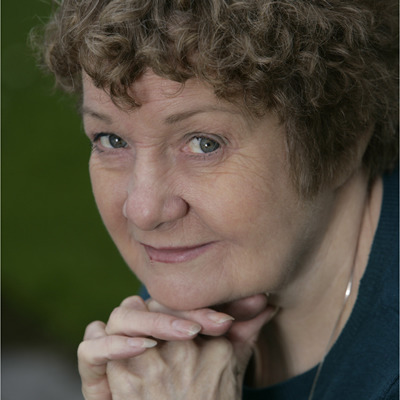
Is there anything you find particularly challenging in your writing?
I create challenges to force me to grow as a writer by putting some craft difficulty into each novel. My first challenge was whether or not I could write a novel. The second novel has a sight-impaired heroine. The historical western romances releasing September and December are an action and a mystery. The action required realism and attention to detail. The mystery was difficult because I write third person and include a point of view of the villain. Usually my readers know everything. Only my characters are kept in the dark. In the mystery, I had to keep the secret a secret from everybody until the end. The challenge in the paranormal suspense novel was to create a consistent literary “world”.
Give us an interesting fun fact about your book or series:
I decided to use Pennsylvania hex signs painted on Pennsylvania Dutch barns in the 1800’s and early 1900s in my Work in Progress (WIP) paranormal suspense manuscript. I grew up in Pennsylvania knowing that these colorful hex symbols were painted so witches would think they were windows, hit their heads against the barn wall, knock themselves out, and thus save the animals and stored crops in the barn from witchcraft.
In the 21st century, the research books I studied went to great length to deny witchcraft and to assure us researchers that hex signs were only colorful, artistic symbols, now considered tourist attractions.
I know better.
How did you come up with the title of your book or series?
The paranormal suspense series has the word “EXPECT” in the title because the lead psychic is a clairvoyant – EXPECT TROUBLE is the first book of the series. My WIP manuscript is EXPECT DECEPTION.
Is there a message in your novels that you want readers to grasp?
My characters are self empowered individuals who take control of their lives and responsibility for their actions. The underlying theme is that life is better when you’re in the driver’s seat.
Title: Matilda’s Song
Series: Prequel to OUT OF THE DARK (but marketed as stand alone)
Author: JoAnn Smith Ainsworth
Duty requires sacrifice…but the heart will not be denied.
Blurb:
At the time, pretending marriage to her middle-aged widower cousin seemed like the best way to escape a politically motivated betrothal to a brutal knight. Now, her journey toward a new life has landed her in hot water—she’s been waylaid by a local Norman baron who’s mistaken her for a real bride. And he demands First Night rights.
Hot water turns to steam in a scalding night of passion…passion she has never known. And now must live without.
Lord Geoffrey is entranced at first sight of the Anglo-Saxon beauty and finds that one night in her arms is not nearly enough. But all he can offer the low-born Matilda is a life in the shadows—as his mistress.
Her head warring with her heart, Matilda resigns herself to her duty in a masquerade of a marriage. It’s a choice that could cost her life.
For the knight who first sought her hand is back with murder on his mind. Now it’s Geoff who’s faced with the ultimate choice: which is more precious…his estates or the love of the one woman who can heal his soul?
Buy at Amazon http://www.amazon.com/Matildas-Song-JoAnn-Smith-Ainsworth/dp/1605043230


March 22, 2013
Confessions of a Cheater
“This Weight Watcher’s point-tracking app is great,” my husband said three days after he’d joined. He walked into the kitchen with his nose buried in his Smartphone. “It even has a scanner.”
“To scan what?” I snorted. “Your weight?”
“No.” He didn’t look up. “Points. On the food packing you can scan the bar codes and get the points.”
“Hmmm. Cool.”
His high interest in tracking and commitment to weight loss made me worry. I’d been on and off the popular plan for close to thirty years. What if he got all skinny and joined Jennifer Hudson as the new spokesperson while I squandered in the background cheating my way through life?
Yes. I’m a cheater. Not the kind who sneaks around with other men, but the kind who lies to herself about what she’s been eating.
In my twenties, I could get away with the lies and still lose weight. My metabolism pumped with the vigor of Jack LaLanne on steroids. To lose weight, all I had to do was eat a little less, crank up the Jane Fonda workout video and “feel the burn.”
The “unrecorded” slice of turkey breast casually popped into my mouth while weighing two ounces, extra knife-dip in the peanut butter jar after carefully measuring a level teaspoon and untracked donut holes from the office break room didn’t sabotage my efforts one bit. For the record, I ate those donut holes as a public service. They’re like broken cookies, right? Why throw them out?
Yet conventional wisdom told me that with age, weight loss would be harder. And never has that been more obvious to me now, at the age of fifty-three.
Three months ago, I rejoined Weight Watchers again after putting on a few pounds. I again followed my loosey-goosey tracking system. Worked in the past, right?
The results were eye-opening and worse than I’d ever imagined. Not only didn’t I lose anything…I gained. YIKES!
Seemed my old methods of tracking — if you can even call it that — had failed me. What would it take for me to start some honest record keeping?
My husband becoming a member, that’s what.
Shame and a little healthy competition sent me straight to my Smartphone. I immediately downloaded the apps. By the end of day one, I’d learned something. These tools were more fun than tracking on paper.
The first week, I didn’t stress about following the diet plan. But I did track my food. REALLY tracked my food. Donut holes and all. The result: Mindfulness settled in with the hard-core facts. I must’ve eaten less because I dropped half a pound.
The second week I got serious. I tried to stay within my daily food range, give or take a growling stomach moment or two. Going to bed hungry wasn’t an option, but if I went over my daily allowance, I tracked it. The result: Down another 1 ½ pounds.
It’s the end of week four. I’m down about 5 pounds. Not Guinness World Records book weight loss, but better than I was doing before. In the thirty odd years I’ve been in and out of Weight Watchers, the truth is I’ve never tracked my food intake for an entire month straight.
Over all the years that I’ve attended Weight Watchers meetings, one remark heard time and time again from the real “losers” is how they religiously write down what they eat. I failed to understand why it worked, but now I do. I record it, I own it. Guilt disappears, perspective is gained. Indulging in more bad choices doesn’t happen when the actual damage is obvious…and not as bad as I’d thought.
I’m no longer feeling like the adulterous of diets. Hank Williams may have sung that “your cheating heart will make you weep,” but my cheating heart will no longer overeat. But if it does, it’ll make sure to write it down.
Any other tales of cheating out there? What motivates you to eat healthy and exercise?


March 6, 2013
The Very Inspiring Blog Award
Fellow Blue Ridge Literary author Dixie Lee Brown, whose debut novel ALL OR NOTHING will be released March 12th, has nominated me for this award. Thanks, Dixie!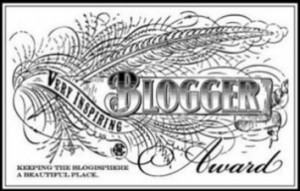 In turn, I will nominate three more worthwhile recipients. But before I do, I will provide you with 7 things you didn’t know about me.
In turn, I will nominate three more worthwhile recipients. But before I do, I will provide you with 7 things you didn’t know about me.
Since I tend to be an open book, these may be things you’ve heard before. But here goes!
1. In third grade, I started to lie to my mother about brushing my teeth before bed (a phase, I guess). Popcorn was my night-time snack of choice and, as one might expect, by not brushing my teeth the kernels got stuck in my gums. So many kernels that the dentist had to surgically remove them. Popcorn was removed from my diet. Moral of the story: don’t lie. It’ll bite you in the butt.
2. I love dogs. I especially love my dogs. (okay, not news but it had to make my list)

Teddy and Mollie
3. I used to take ballet lessons. Those who know the grace with which I move as an adult will find this amusing. (sorry, no picture of me in a tutu)
4. Despite my take-charge exterior, I’m often lacking in confidence. Luckily, I never let it stop me!
5. I wish I could run/jog like a normal person. I mean, my legs work. But I get a side dish of heavy breathing and abdominal pain whenever I try. In fact, I even get a slight twinge of pain when I pass runners in my car. I occasionally have dreams where I’m running. It’s never like real life. Every movement is fluid and breath ‘normal.’ Ah, I wish…
6. I love sixties and seventies rock n’ roll and would love to have attended Woodstock.
7. My dream home would be in Tuscany, where I would write and eat the wonderful food of the region…without counting Weight Watchers points!
Enough about me. I’ve nominated the three blogs below to carry the torch of this award. If your name is here and you have time to play along, Here are the rules:
Display the award logo on your blog.
Link back to the person who nominated you.
State 7 things about yourself.
Nominate other bloggers (the number seems to vary) and link back to them.
That’s it – piece of cake! And the awards go to…


February 20, 2013
Author Interview: Children’s Author Katy Koontz – Showing Our Children How It Takes a Village
The simplest lessons in life are often forgotten as we become adults.
When I asked children’s author Katy Koontz (a fellow Blue Ridge Literary Agency author) to visit my blog, I never dreamed her book, The Banana Police, would have a lesson for me, too.
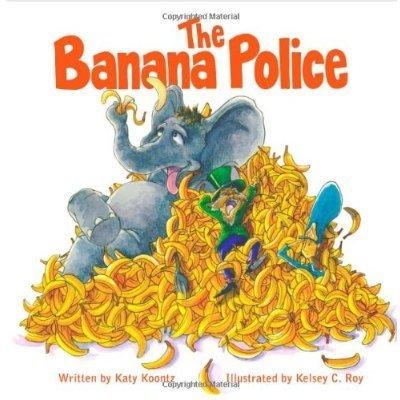
The Banana Police by Katy Koontz
This lovely children’s story, about co-existing with our neighbors, gave me a moment to pause and think about my own small town. Most days here are problem-free, but every so often we find ourselves divided on an issue, easily forgetting how much we all need one another to make this great place work smoothly. Katy’s book showed why it’s important to accept our neighbors, despite differences. A second lesson emerges, too; finding the courage to admit when you’ve made a mistake. No matter how old you are, these lessons are worth repeating.
Katy, thank you for taking time to talk about your book.
Q. What is The Banana Police about?
A. The Banana Police takes place in jungle town where people happily co-exist with elephants—until the townspeople become increasingly annoyed with their lovable, lumpy neighbors. After all, the elephants snore loudly, hog the best seats at the movies, and block all the aisles in the supermarket. Who needs that? When Mayor McFroontz calls on the elephant police to devise a clever scheme to get the elephants to leave, the town ends up buried in all the extra bananas the beasts usually eat.
Q. What will kids get out of reading The Banana Police?
A. What really makes this story shine is the unspoken message about the value of inherently different groups—in this case, the elephants and the townspeople—learning how to live together and cooperate peacefully.
Q. What sets The Banana Police apart from other children’s books?
A. The Banana Police is a little unusual in that there’s no hero or central character. Although Mayor McFroontz is the only character with a real name, the story certainly isn’t about him—and in the end, it’s the clever townspeople working together who become the real heroes.
First, they work together to come up with amazingly creative ways to solve their problem. When they attack the mountain of bananas, they end up eating them plain, fried, baked, boiled, mashed, sliced, puréed, frozen, pickled, and even covered with hot fudge and nuts, peanut butter and marshmallow fluff, and spinach and creamed corn. You gotta love people who are brave enough to eat bananas with spinach and creamed corn!
An even more important reason why the townspeople are heroes is that they are big enough to admit they made a mistake. After they finish eating all those bananas, they realize that they really need the elephants after all! So they call on the elephants to return. Living together isn’t necessarily easy, but the townspeople do learn to appreciate their lovable, lumpy neighbors after all.
Q. What inspired you to write The Banana Police?
A. I wrote The Banana Police for my daughter, Sam, soon after she was born in 1993 because I was so excited to have this beautiful little baby girl and I thought it might be fun to write some silly stories for her. When I was a child, I wrote stories all the time, and I even wrote a song called “Elephant Banana” for my stuffed elephant PJs. So when I sat down to write something for my daughter, that song came to mind, and it got me thinking about elephants and bananas. The rest just tumbled out of my imagination.
I was under no pressure to please anyone else, and my newborn certainly didn’t have any expectations. (If she did, she certainly kept them to herself!) I read the story to Sam several times when she was growing up, and I even read it aloud once at her school. But I didn’t even consider trying to publish it until Sam was in her last year of middle school. At that point, I did some more tweaking here and there, but the tale is essentially the same as when it originally came to me.
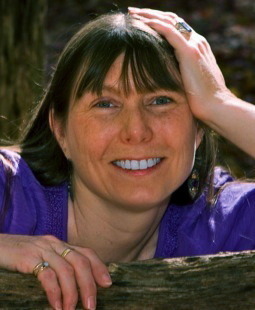
Author Katy Koontz
To read an excerpt, visit the book’s website, TheBananaPolice.com
To view a video of the book click here.
Available online at Amazon.com and BarnesAndNoble.com
Or visit the publisher’s website www.WillowMoonPublishing.com
Available in print or e-book (Kindle and Nook)


February 7, 2013
When the Teacher Learns from the Student
“Little eyes are always watching.”
These gentle words of wisdom were cast out by the principal at my daughter’s elementary school on Open House night.
A true statement. One I’ve never forgotten. One that has served as a constant reminder to put my best foot forward around my kids. I wanted to show them how to behave, how to treat others and how to reach for their dreams.
That last one, though, was the toughest.
In my twenties, I was a real go-getter. Everything changed at the age of thirty with my first baby. Work promotions and my thriving career took the third row seat in the minivan, trumped by the safety, security and happiness of my kids. It was a different dream, one not nearly that impressive or obvious to my children. Sure, I’d share stories about the “old” me, the one who reached for the brass ring of college and career success. But their day-to-day mom wore sweatpants and would often forego makeup. Not too impressive.
In fact, my adjusted outlook on life never bothered me until my oldest started to look at colleges.
While she prepared for the start of her journey into young adulthood, I was reminded of my own zest for life at her age. Hadn’t I once had loftier goals?
The truth, I finally admitted, was that with age came a fear of trying anything new. Thank God my daughter’s enthusiastic outlook on the future was contagious. In spite of my fears, I figured if she could tromp off to a new place, I could take a few baby-steps toward bigger goals, too. That’s when I started a second career as a writer.
Five years later, I still marvel at how my darling daughters show bravery and courage with every event they undertake. They show me their limitless desire to learn, to step out for a cause they believe in and to take a chance in life. Because of watching them, I’ve raised the bar of my comfort level and taken on tasks previously too daunting to think about.
This week, they’ve wowed me again. One just left on a year-long journey clear across the country. The other called from college two days ago, begging to spend a month in Madagascar to study animal life. Her ‘pro’ argument was, and I quote, “Hear me out. I know you’re thinking Africa is scary but the teacher said they only had one coup in all the years she’s gone.”
Um, isn’t one coup enough for a mother to say no? Actually, no. Because then I’d squash her dream.
They inspire me to embrace rather than fear the new opportunities and successes I’ve encountered along the way in my new career. Especially when it’s darn hard to put yourself out there some days. But my old, tired eyes are always watching them and drawing encouragement from the things they do.
Have your children taught you a lesson lately?


January 18, 2013
In Search of Peace, Love and Rock n’ Roll
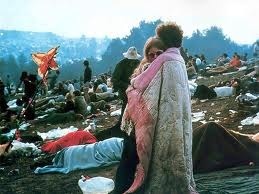 Where were you between August 15-18, 1969?
Where were you between August 15-18, 1969?
I was ten and living in Poughkeepsie, NY. Not far from the three-day event known world-wide as “Woodstock.” The music and message of peace and love from the concert has always stayed with me. In fact my XM radio stays on a station playing only classic rock. On a visit to Bethel Woods last year I even had a chance to stand on the hallowed concert grounds. To say it was awesome would be an understatement.
Since I love everything Woodstock, I’m thrilled to share with you my interview with fellow Blue Ridge Literary author Michael Murphy.  His novel, GOODBYE EMILY, centers on three baby boomers who relive their 1969 trip to Woodstock.
His novel, GOODBYE EMILY, centers on three baby boomers who relive their 1969 trip to Woodstock.
This road trip is more than a vacation. It’s a chance for sixty-year-old Walt “Sparky” Ellington to regain his deteriorating health. The loss of both Emily and his job as a professor has turned him into a bitter man. Closure over losing the love of his life is a step towards better health, the reason he decides to scatter her ashes at the place where they met…Woodstock. To recreate the original trip, he brings his friend, Buck, whose scars from serving in Vietnam rest a layer beneath his surface and Josh, who has been living in a nursing home due to the onset of early Alzheimer’s.
Michael deals with the sensitive topics of aging with insight, humor and a lineup of memorable characters.
Thank you, Michael for joining me. What gave you the idea for this story?
So much has been written over the years about Woodstock’s great performances, but little about what led nearly half a million to come for all over and endure the rain and mud and stay for the music. The famous cover photo for the album and documentary of a couple wrapped in a blanket particularly inspired me. They met at Woodstock and eventually married, like Sparky and Emily.
As I get older, it seems life takes on clarity that can only come from experience. Do any of the characters in Goodbye Emily find that to be true?
The road trip the three men take is also metaphorically a journey of self-discovery. In Young Adult novels, characters come of age. In Goodbye Emily, they come to a similar, though belated, self-discovery, so that at the end, they’re looking forward to life’s challenges.
What message would you like readers to take away from Goodbye Emily?
That growing older doesn’t mean we have to grow old. By that I mean we don’t want to become the grumpy “get off my lawn” kind of person. We should laugh and love no matter what no matter what our age.
Were you at Woodstock?
I was not at Woodstock, but as a west coast guy (Arizona) I went to the Monterey Pop Festival after graduating high school in 1968.
You’ve also been blogging about Woodstock. Have you learned anything new about Woodstock that you didn’t know before?
Plenty, like Jimi wasn’t Jimi Hendrix’s real name. His manager gave him that name in 1965. He was born Johnny Allen Hendrix. And Oscar-winning director Martin Scorsese got his start as a film editor working on the 1970 documentary Woodstock. Lots more on the blog, http://blog.mjmurphy.com
What will appeal to baby boomers the most about Goodbye Emily?
Baby boomers love that I’ve portrayed people in their sixties as funny, smart, driven, still idealistic and optimistic about the future. It’s how we are, after all.
Who’s your favorite group that performed at Woodstock?
There are so many and I have even greater respect for them than I did before I wrote the novel. My favorite group has become Country Joe (and the Fish) because I’ve gotten to know him over the past year, after he read Goodbye Emily and raved about it. He still performs, is active and his next door neighbor is Wavy Gravy.
Michael, thanks for joining me today. I loved your book and wish you much success! Anybody care to share about Woodstock, rock n’ roll or how visiting the past helped them move forward?
GOODBYE EMILY IS AVAILABLE AT AMAZON.COM


December 21, 2012
The True Meaning of Community
One crisp December night twenty years ago, from my outside deck and through sliding glass doors, I watched my two-year-old daughter wander the unsupervised living room, dining room and kitchen of our tri-level townhouse. Her confused expression asked, “Why isn’t Mommy coming inside?”
I wasn’t coming inside because she’d mistakenly locked me out on a second story deck with no access to the ground. For ten minutes, I yelled for help. Not one person heard my cries.
Her puzzled expression switched. I could see the wheels of thought spin as she went over to the cords of the vertical shades. Slowly they closed, taking away any ability to keep a motherly eye on her. I pounded on the glass like a mad woman until she opened them, her expression more confused than before.
A moment later, she disappeared into the kitchen and returned dragging a chair up to the closet door. Climbing up onto it, as if she were trying to reach something inside, she kept glancing in my direction, almost begging me to come inside to make her get down. Boy did I yell. After a minute, she climbed off the chair, wandered into the middle of the living room then curled into a ball on the floor and cried.
That moment still rips me apart.
A neighbor finally opened her door to say goodbye to a guest. Within seconds she’d thrown me a coat, cordless phone and alerted the entire complex. Cell phones didn’t exist, but I called my husband’s office, fifty minutes away, and learned he’d already left.
The neighbors gathered on the ground below. Some stayed to offer me words of encouragement while the others tried to find a way to break into my well-secured home. The only thing holding me together for the next half hour, until I finally heard the squeal of my husband’s car brakes, was the support of my condo community. The ordeal ended with lots of tears (mostly mine) and, thankfully, no injuries to my daughter.
A week ago, I’d started to write a blog post about that night. Every December something kicks off a haunting reminder of my short ordeal. Like everyone else in the country, though, a week ago my world stalled as I watched the events unfold at Sandy Hook Elementary School.
I live in Bethel, next door neighbor to Newtown, Connecticut where you’ll find the small village of Sandy Hook. The towns around here are linked by thin threads; sports, church, dance classes. Even on my own street, two neighbors have ties to victims of the tragedy.
Five days after the horrible events at the school, I assumed things had quieted down in the small town so my family brought flowers to the memorial at the firehouse used as a staging area during the crisis. Despite pouring rain and the passage of several days since the tragedy, crowds still filled the narrow streets. They added more candles, notes and other mementos to memorials that started at the highway exit and continued all the way into the village. They prayed. They respectfully read notes left by loved ones. License plates showed people came from states far away from Connecticut.
As I left Sandy Hook, it hit me how the community of people who care about those twenty precious children and their families plus the brave adults who tried to protect them continues to grow. There are no true borders to define where community starts and ends.
Many days the news makes me lose faith in mankind, yet the outpouring of support for Sandy Hook reminds me of all that is still good in our world. The large extended community surrounding Sandy Hook, in a way, is doing what my neighbors did on that cold winter night, just on a larger scale.
Have you ever been thankful for the random kind act of a stranger or friend? Please feel free to share any thoughts, including those about the kindness you’ve seen this past week.
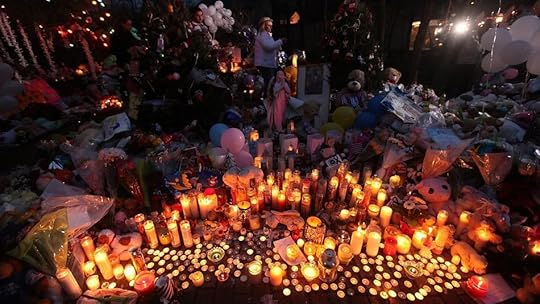
One of the many memorials at Sandy Hook.


November 21, 2012
There’s No Place Like Home
Every year I get cranky as we near thanksgiving.
There’s the dinner preparation with multiple trips to the grocery store. Concerns about overeating. The temptation of leftovers in the days that follow. Political fights at the dinner table. Worse, before the leftovers from dinner are even packed away in the refrigerator, the Black Friday flyers are waiting to remind us the Christmas craziness is about to follow.
I like routine and control. For me, both get lost in the holiday shuffle.
In the midst of my grumbling, though, I often remember the Thanksgiving morning I sat in the hospital with my fifteen-month-old.
Twenty-one years ago, my daughter broke her femur, a bone in the thigh. It happened while lying down and another young child took hold of her foot just as she decided to roll over. The twisted bone splintered like a healthy twig. Ouch. (I still shudder).
Somewhere between breaking the bone and emergency room X-rays, she’d developed a bad fever, common with broken bones. The next six days were spent sitting next to her hospital crib 24/7, where she lay in traction. Surgery could not be performed until the fever broke.
For the record, a one year old forced to stay on her back for six days is something I’d ever want to repeat, although to my daughter’s credit, she rarely complained.
Wednesday afternoon, Thanksgiving Eve, the fever broke. The problem? As the nurse explained, “Most of the surgeons have left to start their own Thanksgiving celebration. Unless it’s an emergency, you’ll have to wait until Friday.”
So, what’s a mother to do? I begged, pleaded, cried and made an all out pain in the butt of myself. All that mattered was getting home for Thanksgiving, even though we had none of the trimmings to fully enjoy the day.
At 7 p.m. Wednesday night, a nursed walked into the room. “A doctor said he’ll stay late to do your daughter’s surgery. However, he made no promises she’ll be released tomorrow.”
The next morning, as I waited for the verdict, I came to see how much the routine of every holiday really meant to me. No, I hadn’t shopped, cooked or had to the house clean for others, but boy-oh-boy did I want to.
This year, when I gather with my loved ones on Thanksgiving Day, I’ll remember to treat each second with the gratitude I’d felt upon our release from the hospital so long ago.
Happy thanksgiving! Please join me and share any of your own special thanksgiving memories.

Happy Thanksgiving!




